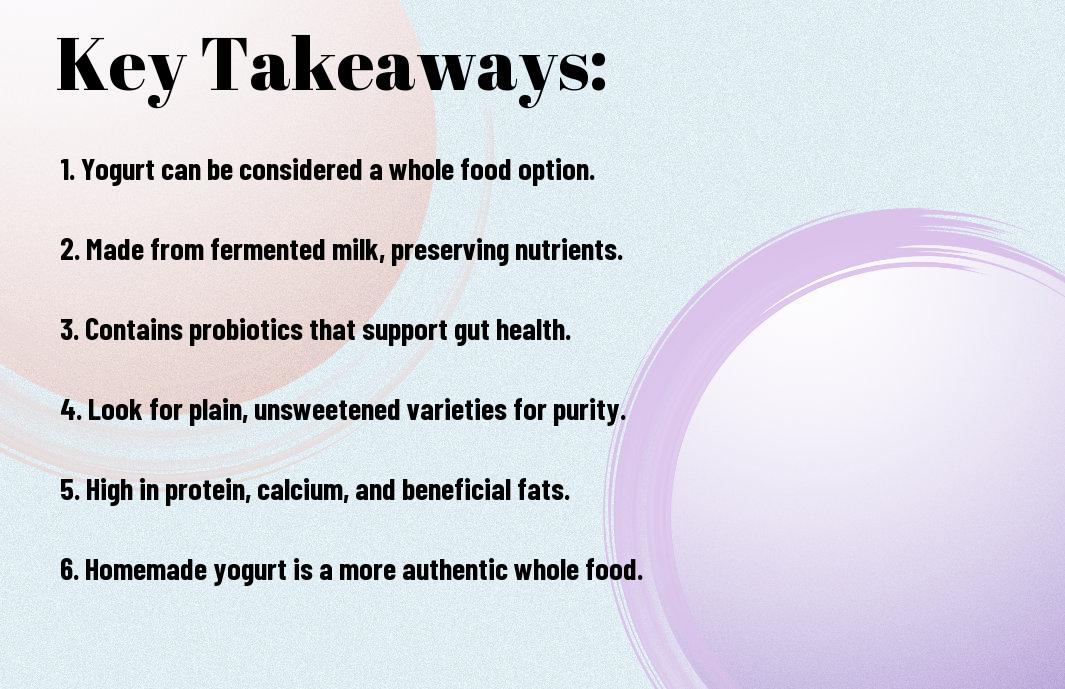There’s a growing interest in understanding whole foods and their role in a healthy diet, leading many to question whether yogurt qualifies as one. In this post, you’ll explore the definition of whole food, the composition of yogurt, and how it fits into your nutritional needs. By the end, you’ll have a clearer understanding of yogurt’s classification and its potential benefits for your health, ultimately helping you make informed choices for your diet.
Key Takeaways:
- Definition of Whole Food: Whole foods are minimally processed and remain as close to their natural state as possible.
- Yogurt Variations: Not all yogurt is created equal; some may contain additives, sugars, and preservatives that detract from its whole food status.
- Nutritional Benefits: Plain, unsweetened yogurt is rich in probiotics, protein, and important nutrients, aligning it closer to whole food principles.
- Ingredients Matter: To consider yogurt as a whole food, look for options with few ingredients, mainly milk and live cultures.
- Personal Choice: Ultimately, whether yogurt fits into a whole food diet depends on individual dietary choices and the specific type of yogurt consumed.

Understanding Whole Foods
For those seeking a healthier lifestyle, it’s crucial to understand what whole foods are and how they can impact your well-being. Whole foods refer to foods that are unprocessed or minimally processed, retaining their natural state. This means they are free from artificial substances, preservatives, and additives, providing you with the best nutritional benefits nature has to offer.
Definition of Whole Foods
Definitionally, whole foods are items that are in their most natural form. This includes fruits, vegetables, whole grains, nuts, seeds, and legumes. These foods contain crucial nutrients and are typically low in unhealthy fats, sugars, and sodium, making them a fundamental part of a balanced diet.
Nutritional Benefits of Whole Foods
Whole foods provide numerous nutritional benefits that can greatly enhance your health. Packed with vitamins, minerals, fiber, and antioxidants, they support your immune system, promote digestive health, and help maintain energy levels. Additionally, consuming whole foods can aid in weight management and reduce the risk of chronic diseases, making them a vital choice for your overall wellness.
Whole foods often contain higher nutritional values compared to their processed counterparts. Since they are rich in fiber, they help you feel full longer, which can be beneficial for weight control. Moreover, the natural antioxidants and phytochemicals found in whole foods can combat oxidative stress and inflammation in your body, leading to improved health outcomes. By incorporating more whole foods into your diet, you empower yourself to make healthier choices and boost your vitality.
The Composition of Yogurt
The composition of yogurt plays a significant role in determining whether it can be classified as a whole food. If you are exploring dietary options, you may find yourself intrigued by the question of Is a Whole Foods, Plant-Based Diet Right for You?. Understanding what goes into yogurt helps you make informed choices about its place in your nutrition.
Ingredients in Yogurt
Ingredients in yogurt primarily consist of milk and live bacterial cultures. While you might find variations in flavors and added sugars in commercial yogurts, traditional yogurt is crafted simply with whole milk and specific bacterial strains that promote fermentation. Always check the ingredient labels to ensure that you’re selecting products that align with your health goals.
Nutritional Profile of Yogurt
Nutritional content in yogurt is typically outstanding, as it provides a range of crucial nutrients that can benefit your overall health. The presence of protein, calcium, and probiotics contributes to various health advantages, such as supporting gut health and enhancing bone density.
It is worth noting that the nutritional profile can vary significantly between different types of yogurt. For example, Greek yogurt contains more protein compared to regular yogurt, making it a great option for muscle recovery. Additionally, choosing plain yogurt can help you avoid excess sugars found in flavored varieties, allowing you to enjoy the myriad benefits of yogurt while staying aligned with your dietary preferences.
Yogurt: Is It a Whole Food?
Many people wonder whether yogurt qualifies as a whole food. This question often hinges on the type of yogurt you are consuming, as not all yogurts are created equal.
Natural vs. Processed Yogurt
Food products like yogurt can be categorized into natural and processed forms. Natural yogurt is made with minimal ingredients, usually just milk and bacterial cultures. In contrast, processed yogurt often contains added sugars, artificial flavors, and preservatives, which can detract from its health benefits.
The Role of Probiotics in Yogurt
Natural yogurt is known for its probiotic content, which supports gut health. Probiotics are live bacteria that can enhance digestion and boost your immune system.
This beneficial component in yogurt helps maintain a balanced gut microbiome, which is crucial for overall health. By consuming yogurt rich in probiotics, you are not only enjoying a tasty treat but also potentially improving your digestion and nutrient absorption.
Yogurt’s Contribution to a Whole Food Diet
Yogurts can be an excellent addition to your whole food diet, providing a source of protein, calcium, and beneficial bacteria. When you choose high-quality yogurt, it can complement other whole foods and enhance your nutritional intake.
Plus, incorporating yogurt into your meals can add variety and flavor while supporting your health goals. Whether enjoyed as a snack or a base for smoothies and dressings, yogurt can seamlessly fit into a whole food diet, making it a versatile and delicious option.

To wrap up
The distinction of yogurt as a whole food largely depends on the type you choose. If you select yogurt that is minimally processed, without added sugars or artificial ingredients, it can indeed be considered a whole food that offers numerous health benefits. Understanding what constitutes a whole food can empower you to make informed dietary choices. For further insights into whole foods, you can explore the Whole Foods Diet Guide: Meal Plans and Shopping Lists.
FAQ
Q: Is yogurt considered a whole food?
A: Yogurt can be considered a whole food if it is made from whole ingredients and does not contain added sugars, artificial flavors, or preservatives. Whole food is often defined as food that is minimally processed and free from artificial substances. Natural yogurts made from whole milk and live cultures fit this definition and retain most of the nutrients found in the original milk.
Q: What kinds of yogurt are healthiest as whole foods?
A: The healthiest yogurts that qualify as whole foods typically include plain, unsweetened varieties made from whole milk or low-fat milk. Look for yogurts that contain live active cultures and minimal ingredients, ideally just milk and cultures. Greek yogurt, which is strained to remove excess whey, can also be a nutritious option, boasting higher protein content while still being considered a whole food when made from whole ingredients.
Q: Are there any downsides to yogurt that is not considered a whole food?
A: Yes, yogurt that is not considered a whole food often contains added sugars, artificial flavors, and other preservatives that can diminish its nutritional value. These additives may lead to increased calorie content and a higher glycemic index, potentially impacting blood sugar levels. Additionally, flavored yogurts may have lower levels of beneficial probiotics due to processing. It’s important to read labels to ensure the yogurt you choose aligns with whole food principles.



